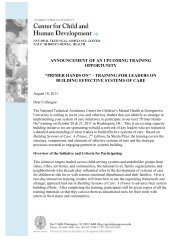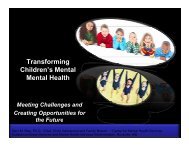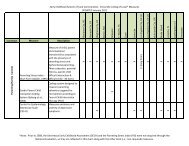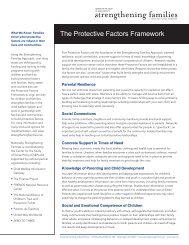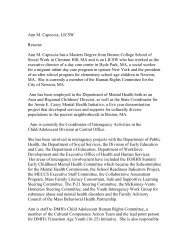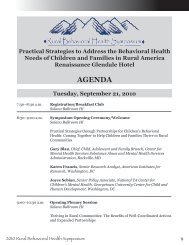Training Institutes 2012 - National Technical Assistance Center for ...
Training Institutes 2012 - National Technical Assistance Center for ...
Training Institutes 2012 - National Technical Assistance Center for ...
You also want an ePaper? Increase the reach of your titles
YUMPU automatically turns print PDFs into web optimized ePapers that Google loves.
WORKSHOPS<br />
During the Workshop, faculty will access the web-based data system online to showcase the type of data it collects, its<br />
functionality, data reports it generates, and how agencies use data <strong>for</strong> quality improvement. The faculty team <strong>for</strong> the<br />
session will offer the perspectives of a funder and oversight agency, as well as a Family Advocate.<br />
MODERATOR/PRESENTER: Anastasia Roussos, M.P.H., System of Care Coordinator, Bureau of Children, Youth,<br />
and Families, Division of Mental Hygiene, New York City Department of Health and Mental Hygiene, Queens, NY<br />
Shirley Berger, M.A., M.P.H., Research and Evaluation Coordinator, Bureau of Children, Youth, and Families, New<br />
York City Department of Health and Mental Hygiene, Queens, NY<br />
WORKSHOP #22 10:30 AM FRIDAY • 1:30 PM SATURDAY • CAPTIVA 1-2<br />
Using Video Conferencing Technology in Systems of Care<br />
OBJECTIVES—Participants will learn:<br />
1. To describe video conference capabilities<br />
2. How to implement video conference capabilities at the state, community, and individual/family level<br />
3. To explain the cost-savings benefits of utilizing video conference technology<br />
4. Strategies <strong>for</strong> creating access to services and supports <strong>for</strong> youth and families<br />
5. How video conference technology can assist in strengthening and empowering wraparound child and family teams<br />
6. How to adhere to the system of care values and principles while utilizing video conference<br />
This Workshop will focus on the evidence-in<strong>for</strong>med practice of utilizing video conferencing technology to address<br />
mental health needs. Faculty will present strategies <strong>for</strong> developing a statewide system that allows individuals, families,<br />
and numerous system partners to utilize video conference technology including financing, support, and sustainability of<br />
the needed infrastructure <strong>for</strong> video conferencing. The in<strong>for</strong>mation and strategies to be highlighted are based on the<br />
experience and work of the Oklahoma Department of Mental Health and Substance Abuse Services, several community<br />
mental health centers, and system of care sites throughout the state.<br />
Specific topics to be covered include:<br />
• The secure features and multifaceted dimensions of video conference technology<br />
• How video conferencing technology can be utilized at the state-level, community-level, and individual-level.<br />
• How child and family team members (i.e. DHS Child Welfare worker, Office of Juvenile Affairs worker, school<br />
personnel, psychiatrist, specialists, etc.) who may not be able to physically attend meetings can use this technology to<br />
attend via video conference.<br />
• How family members from different parts of the state can serve as mentors to other families via video conferencing<br />
• How utilizing video conferencing technology can increase access <strong>for</strong> youth who need inpatient care, <strong>for</strong> youth who<br />
are being discharged from inpatient to community-based services, and can assist in decreasing inpatient length of<br />
stays by increasing the active involvement of the family therapy sessions at the inpatient facility<br />
• The potential of video conferencing technology <strong>for</strong> implementing the system of care approach by facilitating<br />
participation in the development of individualized plans; providing supports to enable services in the most appropriate<br />
and least restrictive environment strengthening the capacity to provide services in the community; providing direct<br />
support <strong>for</strong> youth and families; and providing a feasible mechanism <strong>for</strong> families and youth, involved agencies and<br />
providers, schools, and community resources to collaborate<br />
Participants will experience a live demonstration of video conference technology and will have an opportunity to<br />
brainstorm how video conference technology could be utilized in their home communities. The faculty team will<br />
include the perspectives of an administrator, technician, clinician, and family member.<br />
MODERATOR/PRESENTER: Jeff Harlin, M.S.W., L.C.S.W., Clinical Programs Administrator/System of Care<br />
Director, Grand Lake Mental Health <strong>Center</strong>, Inc., Nowata, OK<br />
Marcia Keesee, L.P.C. Candidate, System of Care Director CREOKS Behavioral Health Services, Sapulpa, OK<br />
RESOURCE PERSON: Chris Tarpley, Technology and In<strong>for</strong>mation Support Coordinator, Oklahoma Department of<br />
Mental Health and Substance Abuse Services, Oklahoma City, OK<br />
82 <strong>Training</strong> <strong>Institutes</strong> <strong>2012</strong>



